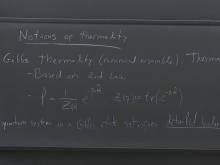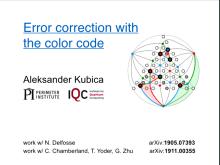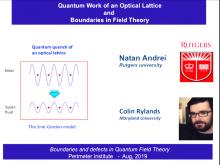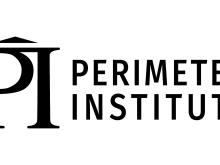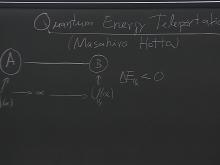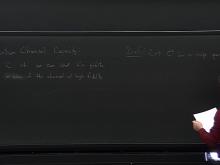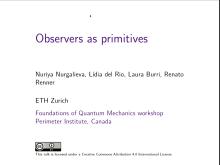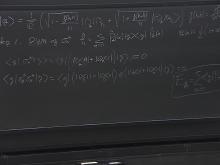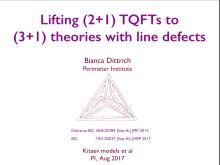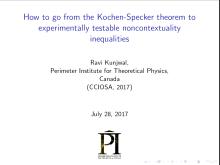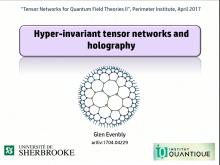Quantum mechanics redefines information and its fundamental properties. Researchers at Perimeter Institute work to understand the properties of quantum information and study which information processing tasks are feasible, and which are infeasible or impossible. This includes research in quantum cryptography, which studies the trade-off between information extraction and disturbance, and its applications. It also includes research in quantum error correction, which involves the study of methods for protecting information against decoherence. Another important side of the field is studying the application of quantum information techniques and insights to other areas of physics, including quantum foundations and condensed matter.
Format results
-
4 talks-Collection NumberC20013
Talk
-

PSI 2019/2020 - Relativistic Quantum Information Part 1 - Lecture 1
Eduardo Martin-Martinez University of Waterloo
-

PSI 2019/2020 - Relativistic Quantum Information Part 1 - Lecture 2
Eduardo Martin-Martinez University of Waterloo
-

PSI 2019/2020 - Relativistic Quantum Information Part 1 - Lecture 3
Eduardo Martin-Martinez University of Waterloo
-

PSI 2019/2020 - Relativistic Quantum Information Part 1 - Lecture 4
Eduardo Martin-Martinez University of Waterloo
-
-
Indefinite Causal Structure
26 talks-Collection NumberC19049Talk
-

-

10 years of the quantum SWITCH: state of the art and new perspectives
Giulio Chiribella University of Hong Kong (HKU)
-

Cyclic quantum causal models and violations of causal inequalities
Ognyan Oreshkov Université Libre de Bruxelles
-

TBA
Laura Henderson University of Waterloo
-

Composing causal orderings
Aleks Kissinger University of Oxford
-

Quantum principle of relativity
Andrzej Dragan University of Warsaw
-

-

What happens when we quantize time?
Alexander Smith Saint Anselm College
-
-
Symmetry, Phases of Matter, and Resources in Quantum Computing
16 talks-Collection NumberC19048Talk
-

Symmetry, topology, and thermal stability
Stephen Bartlett University of Sydney
-

Symmetry-protected topologically ordered phases for measurement-based quantum computation
Akimasa Miyake University of New Mexico
-

A resource theory of nonclassicality in Bell scenarios
Robert Spekkens Perimeter Institute for Theoretical Physics
-

Variational Quantum Eigensolvers and contextuality
Peter Love Tufts University
-

Magic resource theories and classical simulation
Earl Campbell University of Sheffield
-

Classical algorithms for quantum mean values
David Gosset Institute for Quantum Computing (IQC)
-

Fine-grained quantum supremacy and stabilizer rank
Tomoyuki Morimae Kyoto University
-

Towards local testability for quantum coding
Anthony Leverrier Inria Paris Centre
-
-
Boundaries and Defects in Quantum Field Theory
21 talks-Collection NumberC19035Talk
-

Symmetries and Dualities of Abelian TQFTs
Jaume Gomis Perimeter Institute for Theoretical Physics
-

TBD
Leonardo Rastelli Stony Brook University
-

Universality at large transverse spin in defect CFTs
Madalena Lemos European Organization for Nuclear Research (CERN)
-

Domain Walls in Super-QCD
Francesco Benini SISSA International School for Advanced Studies
-

Weyl Anomaly Induced Current and Holography
Rong-Xin Miao Sun Yat-sen University
-

Wilson line impurities, flows and entanglement entropy
Prem Kumar Swansea University
-

Anomalies in the Space of Coupling Constants
Nathan Seiberg Institute for Advanced Study (IAS)
-

-
-
Machine Learning for Quantum Design
30 talks-Collection NumberC19025Talk
-

-

Simulating Thermal and Quantum Fluctuations in Materials and Molecules
Michele Ceriotti L'Ecole Polytechnique Federale de Lausanne (EPFL)
-

How to use a Gaussian Boson Sampler to learn from graph-structured data
Maria Schuld University of KwaZulu-Natal
-

Machine learning meets quantum physics
Dong-Ling Deng Tsinghua University
-

-

Engineering Programmable Spin Interactions in a Near-Concentric Cavity
Emily Davis Stanford University
-

Alleviating the sign structure of quantum states
Giacomo Torlai Flatiron Institute
-

Navigating the quantum computing field as a high school student
Tanisha Bassan The Knowledge Society
-
-
PSI 2018/2019 - Explorations in Quantum Information (Martin-Martinez)
13 talks-Collection NumberC19019Talk
-

PSI 2018/2019 - Explorations in Quantum Information - Lecture 1
Eduardo Martin-Martinez University of Waterloo
-

PSI 2018/2019 - Explorations in Quantum Information - Lecture 2
Eduardo Martin-Martinez University of Waterloo
-

PSI 2018/2019 - Explorations in Quantum Information - Lecture 3
Eduardo Martin-Martinez University of Waterloo
-

PSI 2018/2019 - Explorations in Quantum Information - Lecture 4
Eduardo Martin-Martinez University of Waterloo
-

PSI 2018/2019 - Explorations in Quantum Information - Lecture 5
Eduardo Martin-Martinez University of Waterloo
-

PSI 2018/2019 - Explorations in Quantum Information - Lecture 6
Eduardo Martin-Martinez University of Waterloo
-

PSI 2018/2019 - Explorations in Quantum Information - Lecture 7
Eduardo Martin-Martinez University of Waterloo
-

PSI 2018/2019 - Explorations in Quantum Information - Lecture 8
Eduardo Martin-Martinez University of Waterloo
-
-
PSI 2018/2019 - Quantum Information Review (Gottesman)
15 talks-Collection NumberC19010Talk
-

PSI 2018/2019 - Quantum Information Review - Lecture 1
Daniel Gottesman University of Maryland, College Park
-

PSI 2018/2019 - Quantum Information Review - Lecture 2
Daniel Gottesman University of Maryland, College Park
-

PSI 2018/2019 - Quantum Information Review - Lecture 3
Daniel Gottesman University of Maryland, College Park
-

PSI 2018/2019 - Quantum Information Review - Lecture 4
Daniel Gottesman University of Maryland, College Park
-

PSI 2018/2019 - Quantum Information Review - Lecture 5
Daniel Gottesman University of Maryland, College Park
-

PSI 2018/2019 - Quantum Information Review - Lecture 6
Daniel Gottesman University of Maryland, College Park
-

PSI 2018/2019 - Quantum Information Review - Lecture 7
Daniel Gottesman University of Maryland, College Park
-

PSI 2018/2019 - Quantum Information Review - Lecture 8
Daniel Gottesman University of Maryland, College Park
-
-
Foundations of Quantum Mechanics
17 talks-Collection NumberC18020Talk
-

Welcome and Opening Remarks
Lucien Hardy Perimeter Institute for Theoretical Physics
-

-

-

Local quantum operations and causality
Robert Oeckl Universidad Nacional Autónoma De Mexico (UNAM)
-

Towards synthetic Euclidean quantum field theory
Tobias Fritz Universität Innsbruck
-

Almost quantum correlations violate the no-restriction hypothesis
Ana Belen Sainz Gdańsk University of Technology
-

A device-independent approach to testing physical theories from finite data
Yeong-Cherng Liang National Cheng Kung University
-

Quantum axiomatics à la carte
Alexander Wilce Susquehanna University
-
-
PSI 2017/2018 - Relativistic Quantum Information (Martin-Martinez)
14 talks-Collection NumberC17051Talk
-

PSI 2017/2018 - Relativistic Quantum Information - Lecture 1
Eduardo Martin-Martinez University of Waterloo
-

PSI 2017/2018 - Relativistic Quantum Information - Lecture 2
Eduardo Martin-Martinez University of Waterloo
-

PSI 2017/2018 - Relativistic Quantum Information - Lecture 3
Eduardo Martin-Martinez University of Waterloo
-

PSI 2017/2018 - Relativistic Quantum Information - Lecture 4
Eduardo Martin-Martinez University of Waterloo
-

PSI 2017/2018 - Relativistic Quantum Information - Lecture 5
Eduardo Martin-Martinez University of Waterloo
-

PSI 2017/2018 - Relativistic Quantum Information - Lecture 6
Eduardo Martin-Martinez University of Waterloo
-

PSI 2017/2018 - Relativistic Quantum Information - Lecture 7
Eduardo Martin-Martinez University of Waterloo
-

PSI 2017/2018 - Relativistic Quantum Information - Lecture 8
Eduardo Martin-Martinez University of Waterloo
-
-
Talk
-

Semisimple Hopf algebras and fusion categories
Cesar Galindo Universidad de los Andes
-

The Hopf C*-algebraic quantum double models - symmetries beyond group theory
Andreas Bauer Freie Universität Berlin
-

Modular categories and the Witt group
Michael Mueger Radboud Universiteit Nijmegen
-

Topological Quantum Computation
Eric Rowell Texas A&M University
-

Gapped phases of matter vs. Topological field theories
Davide Gaiotto Perimeter Institute for Theoretical Physics
-

An Introduction to Hopf Algebra Gauge Theory
Derek Wise University of Erlangen-Nuremberg
-

Kitaev lattice models as a Hopf algebra gauge theory
Catherine Meusburger University of Erlangen-Nuremberg
-

Topological defects and higher-categorical structures
Jurgen Fuchs Karlstad University
-
-
Contextuality: Conceptual Issues, Operational Signatures, and Applications
23 talks-Collection NumberC17027Talk
-

Welcome and Opening Remarks
Robert Spekkens Perimeter Institute for Theoretical Physics
-

Quantum Mechanics in a New Key
Simon Kochen Princeton University
-

What do we learn about quantum theory from Kochen-Specker quantum contextuality?
Adan Cabello Universidad de Sevilla
-

Noncontextuality: how we should define it, why it is natural, and what to do about its failure
Robert Spekkens Perimeter Institute for Theoretical Physics
-

Towards a mathematical theory of contextuality
Samson Abramsky University of Oxford
-

Kochen-Specker contextuality: a hypergraph approach with operational equivalences
Ana Belen Sainz Gdańsk University of Technology
-

The contextual fraction as a measure of contextuality
Shane Mansfield University of Edinburgh
-

Nonlocality and contextuality as fine-tuning
Eric Cavalcanti Griffith University
-
-
Tensor Networks for Quantum Field Theories II
18 talks-Collection NumberC17011Talk
-

Discretizing the many-electron Schrodinger Equation
Steven White University of California, Irvine
-

Emergence of conformal symmetry in critical spin chains
Ashley Milsted California Institute of Technology
-

-

-

Bridging Perturbative Expansions with Tensor Networks
Jutho Haegeman Ghent University
-

The continuous multi-scale entanglement renormalization ansatz (cMERA)
Guifre Vidal Alphabet (United States)
-

Unitary Networks from the Exact Renormalization of Wavefunctionals
Rob Leigh University of Illinois Urbana-Champaign
-

Tensor networks and Legendre transforms
Brian Swingle Brandeis University
-
-
PSI 2019/2020 - Relativistic Quantum Information Part 1
4 talks-Collection NumberC20013PSI 2019/2020 - Relativistic Quantum Information Part 1 -
Indefinite Causal Structure
26 talks-Collection NumberC19049There has been a surge of interest in indefinite causal structure the idea that cause and effect can no longer be sharply distinguished. Motivated both by experimentation with quantum switches and quantum gravity there can be situations in which there is no matter-of-the-fact as to what the causal structure of spacetime is. This meeting will bring together workers in Quantum Foundations and Quantum Gravity in both theoretical experimental physics to discuss the state of the art of current research and set new directions for this emerging subdiscipline.
-
Symmetry, Phases of Matter, and Resources in Quantum Computing
16 talks-Collection NumberC19048Our conference covers three related subjects: quantum fault-tolerance magic states and resource theories and quantum computational phases of matter. The linking elements between them are (a) on the phenomenological side the persistence of computational power under perturbations and (b) on the theory side symmetry. The latter is necessary for the working of all three. The subjects are close but not identical and we expect cross-fertilization between them.Fault tolerance is an essential component of universal scalable quantum computing.However known practical methods of achieving fault tolerance are extremely resource intensive. Distillation of magic states is in the current paradigm of fault-tolerance the costliest operational component by a large margin. It is therefore pertinent to improve the efficiency of such procedures study theoretical limits of efficiency and more generally to establish a resource theory of quantum state magic. During the workshop we will focus on a fundamental connection between fault-tolerant protocols and symmetries.``Computational phases of matters are a surprising link between quantum computation and condensed matter physics. Namely in the presence of suitable symmetries the ground states of spin Hamiltonians have computational power within the scheme of measurement-based quantum computation and this power is uniform across physical phases. Several computationally universal phases have to date been discovered. This subject is distinct from the above but linked to them by the feature of persistence of computational power under deformations and deviations.
-
Boundaries and Defects in Quantum Field Theory
21 talks-Collection NumberC19035Boundaries and defects play central roles in quantum field theory (QFT) both as means to make contact with nature and as tools to constrain and understand QFT itself. Boundaries in QFT can be used to model impurities and also the finite extent of sample sizes while interfaces allow for different phases of matter to interact in a controllable way. More formally these structures shed light on the structure of QFT by providing new examples of dualities and renormalization group flows. Broadly speaking this meeting will focus on three areas: 1) formal and applied aspects of boundary and defect conformal field theory from anomalies and c-theorems to topological insulators 2) supersymmetry and duality from exact computations of new observables to the construction of new theories and 3) QFT in curved space and gravity from holographic computations of entanglement entropy to ideas in quantum information theory. Registration for this event is now open.
-
Machine Learning for Quantum Design
30 talks-Collection NumberC19025Machine learning techniques are rapidly being adopted into the field of quantum many-body physics including condensed matter theory experiment and quantum information science. The steady increase in data being produced by highly-controlled quantum experiments brings the potential of machine learning algorithms to the forefront of scientific advancement. Particularly exciting is the prospect of using machine learning for the discovery and design of quantum materials devices and computers. In order to make progress the field must address a number of fundamental questions related to the challenges of studying many-body quantum mechanics using classical computing algorithms and hardware. The goal of this conference is to bring together experts in computational physics machine learning and quantum information to make headway on a number of related topics including: Data-drive quantum state reconstruction Machine learning strategies for quantum error correction Neural-network based wavefunctions Near-term prospects for data from quantum devices Machine learning for quantum algorithm discovery Registration for this event is now closed
-
PSI 2018/2019 - Explorations in Quantum Information (Martin-Martinez)
13 talks-Collection NumberC19019PSI 2018/2019 - Explorations in Quantum Information (Martin-Martinez) -
PSI 2018/2019 - Quantum Information Review (Gottesman)
15 talks-Collection NumberC19010PSI 2018/2019 - Quantum Information Review (Gottesman) -
Foundations of Quantum Mechanics
17 talks-Collection NumberC18020The foundations of quantum mechanics have been revitalized in the past few decades by three developments: (i) the influence of quantum computation and quantum information theory (ii) studies of the interplay between quantum theory and relativity particularly the analysis of indefinite causal structure and (iii) proposals to reconstruct quantum theory from basic axioms. There have also been very interesting developments in understanding and classifying no=locality and contextuality using tools from sheaf theory and cohomology as well as operator algebras and category theory. The International Congress of Mathematical Physics is a natural forum for the discussion of these topics. In the past there have been satellite workshops on topics like Operator algebras and quantum statistical mechanics which also address fundamental issues. The modern study of quantum foundations is very much influenced and informed by mathematics: sheaf theory and cohomology category theory information theory convex analysis in addition to the continuing interest in operator algebras and functional analysis. The aim of the workshop is to bring together researchers who have made substantial contribution to the recent developments. The workshop will be held at Perimeter Institute over a five day period from July 30
-
PSI 2017/2018 - Relativistic Quantum Information (Martin-Martinez)
14 talks-Collection NumberC17051PSI 2017/2018 - Relativistic Quantum Information (Martin-Martinez) -
Hopf Algebras in Kitaev's Quantum Double Models: Mathematical Connections from Gauge Theory to Topological Quantum Computing and Categorical Quantum Mechanics
18 talks-Collection NumberC17029The Kitaev quantum double models are a family of topologically ordered spin models originally proposed to exploit the novel condensed matter phenomenology of topological phases for fault-tolerant quantum computation. Their physics is inherited from topological quantum field theories, while their underlying mathematical structure is based on a class of Hopf algebras. This structure is also seen across diverse fields of physics, and so allows connections to be made between the Kitaev models and topics as varied as quantum gauge theory and modified strong complementarity. This workshop will explore this shared mathematical structure and in so doing develop the connections between the fields of mathematical physics, quantum gravity, quantum information, condensed matter and quantum foundations.
-
Contextuality: Conceptual Issues, Operational Signatures, and Applications
23 talks-Collection NumberC170272017 marks 50 years since the seminal 1967 article of Kochen and Specker proving that quantum theory fails to admit of a noncontextual model. Despite the fact that the Kochen-Specker theorem is one of the seminal results concerning the foundations of quantum theory, there has never been a large conference dedicated to the subject. The 50-year anniversary of the theorem seems an opportune time to remedy this oversight. Furthermore, in the last decade, there have been tremendous advances in the field. New life has been breathed into the subject as old conceptual issues have been re-examined from a new information-theoretic perspective. Importantly, there has been great progress in making the notion of noncontextuality robust to noise and therefore experimentally testable. Finally, there is mounting evidence that the resource that powers many quantum advantages for information processing is contextuality. In particular, it has been shown to underlie the possibility of universal quantum computation. Many groups worldwide are actively engaged in advancing our knowledge on each of these fronts and in deepening our understanding of the distinction between quantum and classical theories through the lens of contextuality. Through this conference, we aim to bring together leading researchers in the field in order to develop a broader perspective on the issues, draw connections between different approaches, foster a more cohesive community, and set objectives for future research.
-
Tensor Networks for Quantum Field Theories II
18 talks-Collection NumberC17011Tensor Networks for Quantum Field Theories II
